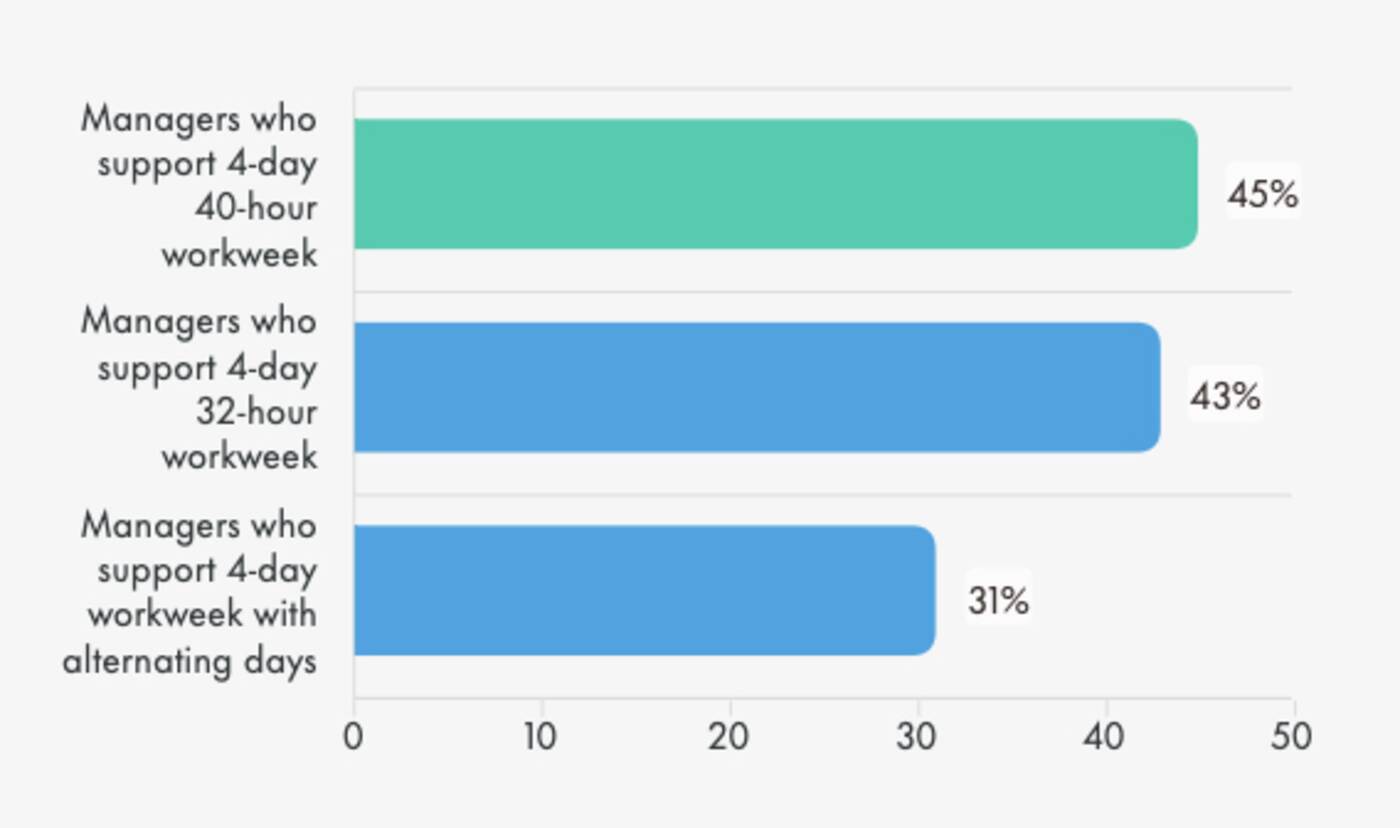
Experts say a 4-day work week is 'inevitable' in Canada
Support continues to grow in North America for the concept of a standardized, four-day work week — and not only among the exhausted, overwhelmed employees who could use another day off to rest or, you know, do life stuff.
A recent survey conducted by the recruitment agency Robert Half Canada found that 91 per cent of senior managers across a variety of organizations with more than 20 employees were in favour of "some type of four-day work week."
Of the 1,449 managers surveyed, 45 per cent supported the idea of a "compressed" work week, in which their teams would work 10 hours a day for four consecutive days. Approximately 43 per cent of managers preferred the idea of a four-day, 32-hour work week, where employees work eight hours per day as usual, but still get three days off every weekend.
When asked if they supported the idea of a four-day work week with alternating days off, only 31 per cent of managers answered yes, suggesting that a "long weekend"-type model would be more popular among employers than a complicated, rotating "here's who works which days this week" situation.
In a different survey, Robert Half found that 70 per cent of workers "would be willing to put in four 10-hour workdays in exchange for an additional day off each week" to have an extra day at home and more work-life balance.

Ninety-one per cent of senior managers from small, mid-sized and large companies said they would favour some type of four-day work week for their teams in a recent survey. Image via Robert Half Canada.
"Once considered little more than a thought experiment, the condensed schedule is quietly gaining momentum, with many business leaders now viewing it as an inevitability in the coming years," reported the Globe and Mail this week of the trend.
Indeed, 69 per cent of managers surveyed by Robert Half anticipated that their company would adopt some version of the four-day work week within the next five years in an effort to attract and retain talent.
Here in Toronto, dozens of businesses have adopted the organizational model with great success, reporting improved job satisfaction, productivity and retention among employees.
Companies like Unilever in New Zealand, Microsoft in Japan, and the U.S. fintech startup Bolt jumped onto the trend early, paving the way for more than 200 global organizations listed in this directory of employers with four day, 32-hour work weeks.
"It is really taking off as a notable trend in areas like tech, software, ICT, finance and professional services – knowledge-based roles that used to be primarily office-based, but are now in many cases are hybrid or remote," said Joe O'Connor of the Toronto-based Work Time Reduction Center of Excellence to the BBC late last month.
Describing the model as "a tool for competitive advantage in terms of talent, attraction and retention, O'Connor told the BBC that we "could see a scenario in tech where by 2026, not offering a four-day week is almost a competitive disadvantage."
"The four-day week is not going to be 100 per cent of the economy, much like the five-day week is not wholly representative of the economy now," he said. "But it certainly could become the new normal."
From experiment to inevitability.
— Joe O'Connor (@JoeOC99) February 7, 2023
🔴 A majority of senior managers in 🇨🇦 support the #4DayWeek and expect it to be introduced in their company in the next 5 yrs
🔴 Most employees would opt for a #4DayWeek instead of a pay rise ⏳️@WTRCoE #ItsAboutTime https://t.co/wENnUDZVoy
And it's not only private employers, but governments exploring the concept, including those in Spain, Scotland, Iceland, Belgium, Spain, Portugal and even Ontario (where both the Liberal and NDP parties promised to follow suit if elected ahead of the last provincial election.)
Just a few weeks ago, the Municipality of French River in northern Ontario announced that it would make four-day work weeks permanent for its staff following a successful pilot project.
"I'm happy that this has worked out and that the employees are enjoying the new work schedule, alongside being able to service our public an extra half-hour per day," said French River's chief administrative officer, Marc Gagnon, to CBC News on Jan. 27.
With 87 per cent of the municipality's employees participating in the pilot, Gagnon said that it improved morale among workers with no decrease in productivity and no negative feedback from members of the public.
It's hard to say exactly how many companies in Canada have already made the switch, even as a trial, but local organizations around the world seem to be more interested in the four-day work week than ever — so much so that TIME Magazine recently published a piece entitled "Why 2023 Could Finally Be the Year of the 4-Day Work Week."
The results of Robert Half Canada's survey indicate that the trend will only intensify as unemployment rates remain historically low and companies compete for skilled workers... and if reaction to our 2022 April Fools Day post is any indication, workers are here for it.
Latest Videos
Latest Videos
Join the conversation Load comments







